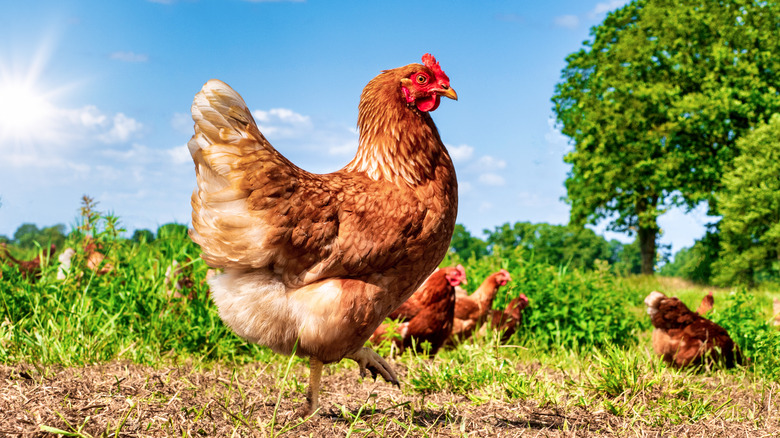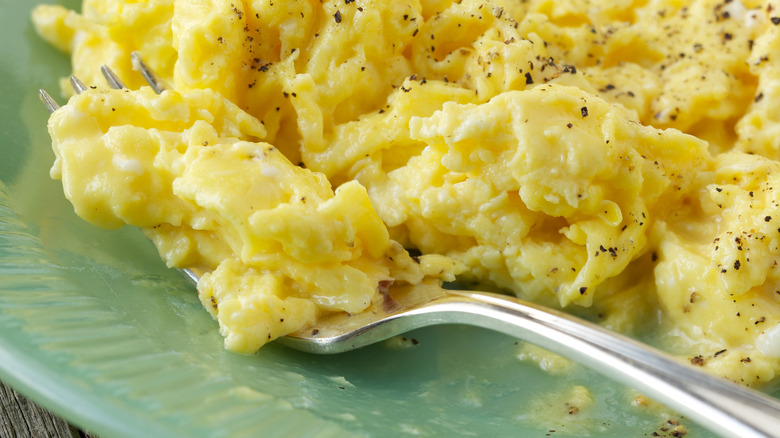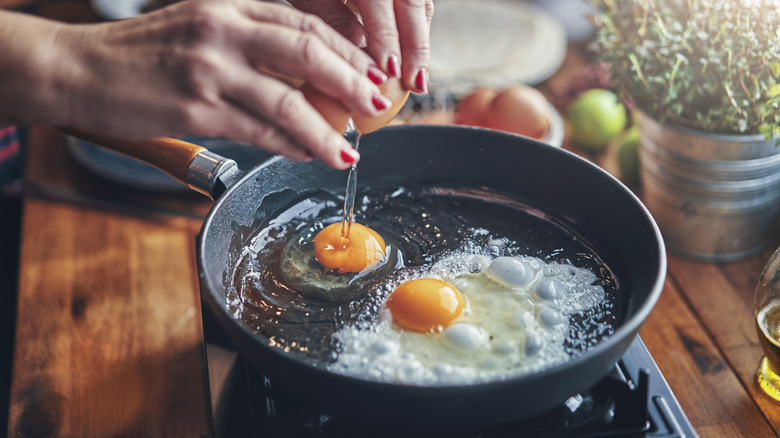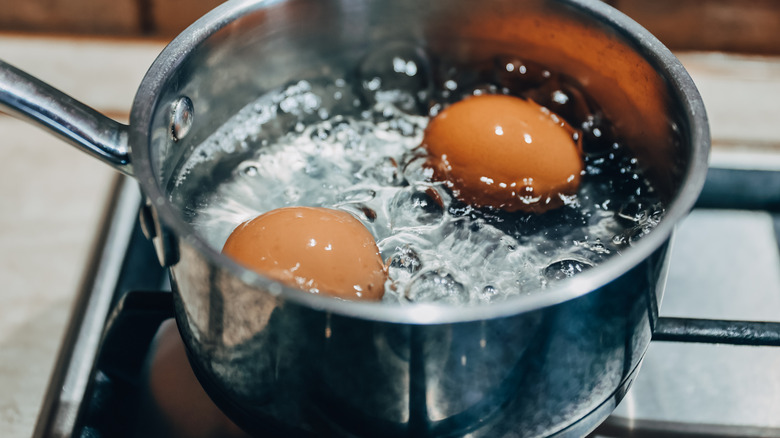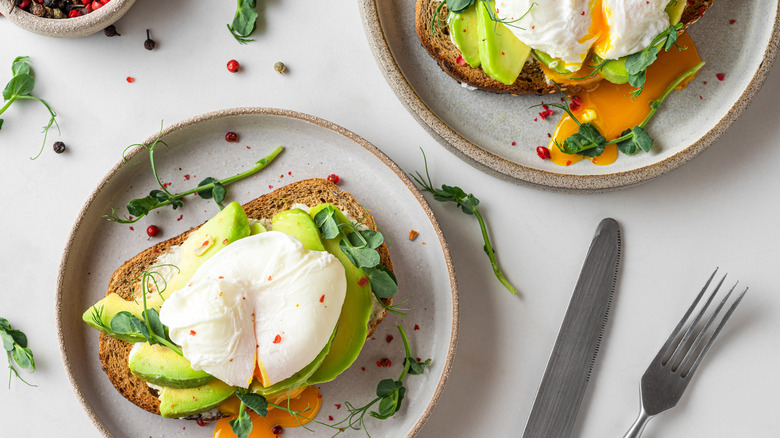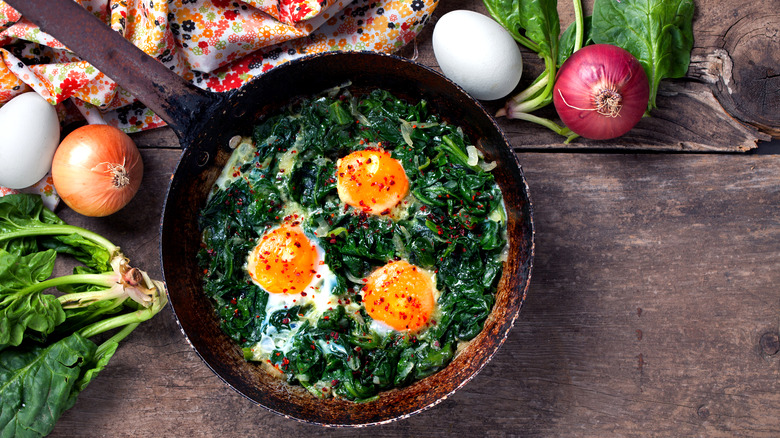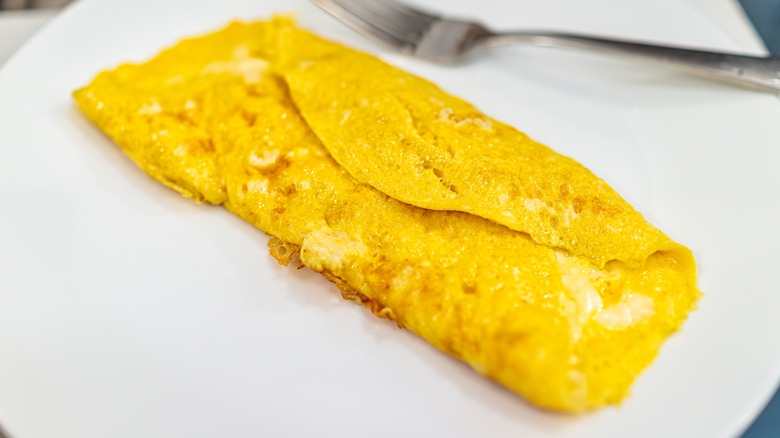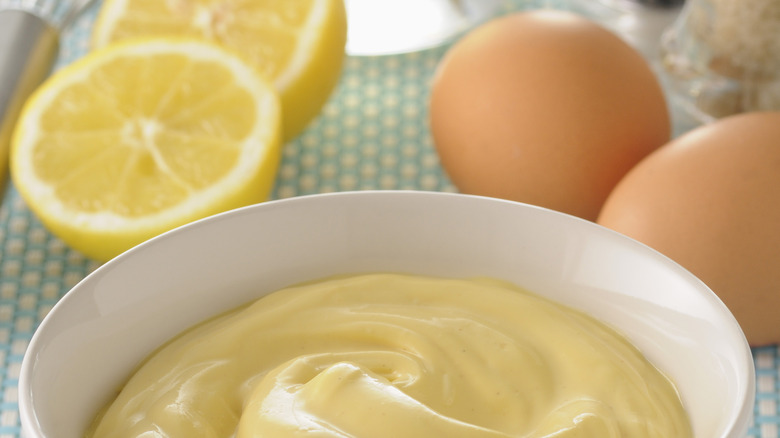Gordon Ramsay's 8 Best Tips For Cooking Eggs
Eggs are a staple store cupboard ingredient across the globe and feature in many different cuisines. Readily available, affordable, and nutritious, eggs are packed with vitamins, contain selenium and iodine, are a great source of protein, and offer an incredibly versatile range of uses. Even in the hands of an amateur cook, eggs can quickly become a simple snack, or provide a savory garnish that can elevate a dish to the next level.
One man who knows his eggs is world-renowned chef Gordon Ramsay. While Ramsay currently enjoys seven Michelin stars, the humble egg is not beneath his cooking repertoire, and over the years he has shared many useful cooking tips, including some vital tips and tricks on the best way to prepare all kinds of eggs and egg-based dishes.
Following Gordon Ramsay's expert advice will help you become more confident when cooking. From making your morning scrambled eggs sensational to a cunning hack for peeling boiled eggs, here are tips from Gordon Ramsay that will help your egg cookery levels become eggcellent.
Only use free range eggs
As with any ingredient, the quality of the eggs you use is important. Gordon Ramsay is an advocate of using free-range eggs, preferably organic ones. Ramsay's official website states: "Not only do free-range or organic hens have a better quality of life, they also produce much tastier eggs — so it's a win, win."
What constitutes a free-range egg varies from country to country, but in the U.S., the United States Department of Agriculture decides the standard. "Eggs packed in USDA grade marked consumer packages labeled as free-range must be produced by hens that are able to roam vertically and horizontally in indoor houses, and have access to fresh food and water, and continuous access to the outdoors during their laying cycle."
Happy hens lay tastier eggs, so next time you're grocery shopping look out for that crucial free-range label to ensure you're investing in ingredients from a higher-welfare bird. While free-range eggs may cost a little more, the benefits they offer, for both the chickens and you, are worth it.
Finish scrambled eggs with creme fraiche
Knowing how to make a perfect plate of scrambled eggs can take you a long way, from a classic breakfast or brunch to a quick and simple supper. Light and fluffy eggs cooked well are a great match for all kinds of ingredients, from the most plain to the spiciest level you can handle. They're delicious with pan-fried mushrooms, a great accompaniment to bacon, and tasty with any kind of tomato.
Gordon Ramsay also uses scrambled egg cookery as a benchmark of a chef's ability, and he has a top tip to prevent overcooking scrambled eggs. In a MasterClass video, Ramsay shares his method of adding a spoonful of crème fraîche just before the eggs are finished to prevent the residual heat from overcooking the eggs. "Just makes it a little bit cooler, brings down the temperature of the eggs," Ramsay suggests.
Baste fried eggs in butter
Fried eggs are relatively simple to prepare and have a wide range of uses. They are a classic ingredient in a cooked breakfast, fried eggs can take your burger toppings to the next level, and they can complement certain types of meats, such as gammon or steak.
Gordon Ramsay can also help you achieve success with fried eggs thanks to his neat trick to perfect the process. While Ramsay starts his fried eggs cooking with a drizzle of oil, toward the end of the cooking process he adds some small pats of butter around the edge of the egg.
As the butter melts and foams around the egg, it adds a buttery deliciousness and can be maneuvered or spooned onto the top of the egg to give it a golden finish. Once the butter has fully melted, remove the egg from the stove and let the pan's heat finish the cooking. Ramsay always seasons his eggs with salt and pepper and sometimes likes to add a pinch of chili flakes for a spicy twist.
Halt boiled eggs' cooking process with cold water
A soft-boiled egg can provide the finishing touch to a range of delicious dishes from a ham salad to a steaming ramen bowl. In a TikTok video, Gordon Ramsay swears by a six-minute timer for such an egg. Ramsay gets a pan of water hot, then gently drops the eggs in using a spoon. He then brings the water to the boil, but "don't boil them ferociously," advises the chef, or else you could end up with a dark ring around the yolk.
As soon as your six-minute timer sounds, you want to use the spoon to get the eggs out of the pan and place them in a bowl of cold water straight away. Once they've hit the cold water, which will halt the cooking process, quickly whip them out, crack one end of the egg on a flat surface and pop them back into the water.
When you're ready to serve your eggs, in order to get them out of the shell quickly and with no damage, Gordon Ramsay recommends blowing into the cracked shell in order to help separate it from the egg white. This will give you a cleanly peeled egg ready to use in your recipe of choice.
Add tarragon vinegar to your poached eggs' pan
For Gordon Ramsay, the perfect poached egg is all about the preparation before you even touch the egg in question. First off, your egg should be at room temperature, so if you refrigerate your eggs, be sure to remove one in good time before you want to get it poached.
Next is the crucial pan prep. You need to get a pan of water to boiling point and then adjust the heat so you achieve a rolling boil. Once the water is at your desired temperature, add a pinch of salt and a crack of pepper — and then, Ramsay's secret ingredient; a teaspoon of tarragon vinegar.
Use a balloon whisk to get the water moving in a circular motion, creating a vortex in the center of the pan. "Gain momentum in your water which will then carry the egg white around the yolk and poach it perfectly," Ramsay suggests. Drop the egg into the center of the pan and you will see the white wrap around the yolk. "A perfect poached egg will take between 90 seconds and two minutes," says Ramsay.
Create a perfectly-sized well for baked eggs
Adding baked eggs to tray-baked recipes is a fabulous way to take the dish from an average weeknight supper to a memorable meal. There are a wealth of dishes that can benefit from the addition of eggs. Pretty much anything bean-based, recipes with a tomato base, and meals that incorporate spinach work well with eggs.
Gordon Ramsay shares a delicious brunch recipe for Spicy Mexican Eggs. This is a great sharing dish that sees a spicy tomato and black bean stew placed on top of corn tortillas. Ramsay then offers a neat trick for adding the eggs to the dish; he uses an egg to create a well in the stew mixture, therefore ensuring you have a perfectly-sized hole to crack your egg into.
It's "almost like a little dug-out," says Ramsay of the method. Once your eggs are safely in their little wells, Ramsay seasons and adds a grating of cheddar, then bakes the mix in the oven for eight to 10 minutes.
An ideal omelet should be gently folded
A traditional omelet is a quick dish that can work for breakfast or brunch, for a tasty lunch, or even for a simple supper. "An omelet is probably one of the first things you learn to cook at catering college," states Ramsay in an episode of "Kitchen Nightmares."
Gordon Ramsay has used omelet cookery as a test in several shows, most memorably in an episode of "Kitchen Nightmares" in which two young chefs struggled to achieve the delicate finish Ramsay was looking for. Ramsay challenged the chefs to make omelets as a way of showing them how important it is to get the basics right.
There are hundreds of variations of omelet recipes, but Gordon Ramsay likes to keep his simple and healthy. Instead of using cheese or butter to make the omelet rich, Ramsay relies on good quality eggs, beaten very well to ensure a fluffy and light finish. The omelet should have a pale color, and towards the end of the brief cooking time, Ramsay suggests tipping your pan and using a heatproof spatula to lift one edge of the omelet to help you achieve that perfect fold.
Seasoning should be the last thing you add to mayo
Making your own mayonnaise can be a daunting task for your average home cook, but Gordon Ramsay takes the fear out of the process with a super simple video tutorial that explains the process perfectly. "Don't be scared of making it," says Ramsay. "Basically, all it is an emulsification of raw eggs and ground nut oil."
Using ground nut oil is crucial as this kind of cooking oil is what chefs call a "neutral oil," which means it's not flavored. The process of making mayo is not forgiving though, and Ramsay states, "The first 30 seconds of making mayonnaise is the most crucial." You need to add the oil slowly to stop the mixture from splitting.
Want another vital mayo-making tip from Ramsay? "Never season mayonnaise until the end. If you season it, to begin with, you destroy the egg yolks," warns Ramsay. Finally, adding fresh lemon juice gives your mayo what Ramsay describes as a "zesty freshness."

